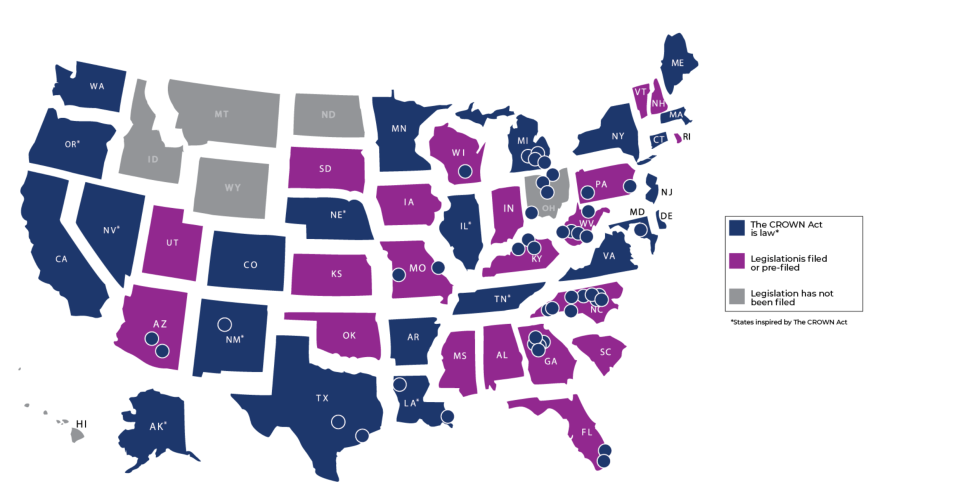A Texas judge will decide if Barbers Hill Independent School District in Mont Belvieu, about 30 miles outside of Houston, violated Texas’ CROWN Act after suspending a Black student for his dreadlocks, which officials said violated the district’s dress code.
Darryl George was suspended on Aug. 31 and referred to in-school suspension and an alternative school program for “failure to comply” with multiple campus and classroom regulations, including a “violation of the dress and grooming policy,” read the letter signed by Lance Murphy, the principal of Barbers Hill High School.
As the trial is set to begin on Feb. 22, here’s what you need to know:
What does the BHISD dress code say?
According to the district’s dress and grooming code, “Male students’ hair will not extend, at any time, below the eyebrows or below the ear lobes. Male students’ hair must not extend below the top of a t-shirt collar or be gathered or worn in a style that would allow the hair to extend below the top of a t-shirt collar, below the eyebrows, or below the ear lobes when let down.”
George’s mother, Darresha George, and Allie Booker, the family’s attorney, have denied that the teenager’s hairstyle violates the district’s policy.
In a formal complaint with the Texas Education Agency and a federal civil rights lawsuit, the family alleges the district failed to enforce a new law outlawing discrimination based on hairstyles.
More: Texas student Darryl George referred to alternative school after suspension over hairstyle
The suit also alleges that Texas Gov. Greg Abbott and Attorney General Ken Paxton have failed to enforce the CROWN Act, which went into effect on Sept. 1 – a day after George was suspended.
George has twisted dreadlocks wrapped and secured to the back of his head that he wears as an “outward expression of his Black identity and culture,” according to the lawsuit filed in the U.S. District Court for the Southern District of Texas.

What is the CROWN Act?
The CROWN Act (HB 567), which stands for “Creating a Respectful and Open World for Natural Hair,” was passed with a bipartisan vote in the Texas legislature and signed into law by Abbott last May. It made Texas the 21st state to ban race-based hair discrimination.
The law prohibits discrimination in schools, workplaces and housing based on certain hair textures or protective hairstyles historically and culturally associated with race.
Hairstyles worn by black women and men are protected under Texas labor codes under racial discrimination based on hair texture or protective hairstyle.
“An employer, labor union, or employment agency commits an unlawful employment practice if the employer, labor union, or employment agency adopts or enforces a dress or grooming policy that discriminates against a hair texture or protective hairstyle commonly or historically associated with race,” the statue says.
What hairstyles are protected by the CROWN Act?
The CROWN Act would ensure protection for Texans who wear their hair in natural styles such as braids, locs, twists or knots.
What states is the CROWN Act legal?

More than 20 states have enacted the CROWN Act as other similar legislation has been filed for several other states. The CROWN Act was passed in these states:
-
Texas
-
Alaska
-
Louisiana
-
California
-
New Mexico
-
Colorado
-
Nevada
-
Oregon
-
Washington
-
Arkansas
-
Tennessee
-
Nebraska
-
Minnesota
-
Illinois
-
Michigan
-
Virginia
-
Maryland
-
Delaware
-
New Jersey
-
New York
-
Connecticut
-
Massachusetts
-
Maine
A national version of the CROWN Act passed the U.S. House last year but failed in the Senate.
— USA TODAY reporter Christopher Cann contributed to this report.
This article originally appeared on Austin American-Statesman: Did a Texas school district violate the CROWN Act? Trial begins soon
Signup bonus from




